Tips for Maintaining Your Air Compressor

Regular maintenance is crucial to ensuring the optimal performance and longevity of your air compressor. By taking proper care of your equipment, you can avoid costly repairs and ensure that your compressor continues to operate efficiently. Here are some essential tips for maintaining your air compressor:
1. Check the oil regularly: Just like any other machine, your air compressor requires regular oil checks. Make sure to check the oil level before each use and top it up if necessary. Clean oil helps lubricate the moving parts and prevent excessive wear and tear.
2. Clean or replace the air filter: The air filter in your compressor prevents dust and debris from entering the system. Over time, the filter can become clogged and reduce airflow, causing the compressor to work harder. Regularly inspect the filter and clean or replace it as needed.
3. Monitor and adjust the pressure: It’s important to monitor the pressure of your air compressor regularly. Operating the compressor at too high or too low pressure can lead to inefficiencies and potential damage. Use a pressure gauge to check the pressure and adjust it accordingly.
4. Drain the condensate: Air compressors accumulate moisture, which can lead to corrosion and damage to the internal components. Regularly drain the condensate from the tank to prevent any buildup. Consult your compressor’s manual for specific instructions on how to properly drain the condensate.
5. Inspect for leaks: Leaks can significantly affect the performance and efficiency of your air compressor. Regularly inspect the hoses, fittings, and connections for any signs of leaks. If you detect a leak, repair it promptly to avoid any further damage.
By following these maintenance tips, you can ensure that your air compressor operates at its best and remains reliable for years to come. Regular maintenance not only extends the life of your equipment but also helps you avoid costly repairs and downtime.
Regular Cleaning and Inspection
Regular cleaning and inspection of your air compressor is essential to ensure its proper functioning and longevity. By regularly cleaning and inspecting your air compressor, you can identify and address any potential issues before they escalate into major problems.
Cleaning
Start by disconnecting the power supply and releasing any built-up pressure in the system. Wipe down the exterior of the compressor using a clean cloth or sponge and a mild detergent. Pay special attention to the air intake vents, as these can become clogged with dust and debris over time. Use a soft brush to gently remove any dirt or debris from the vents.
Next, open the compressor’s access panels or doors to access the internal components. Use a vacuum cleaner or compressed air to remove any dust or debris that may have accumulated. Be careful not to damage any sensitive components during this process.
Inspection
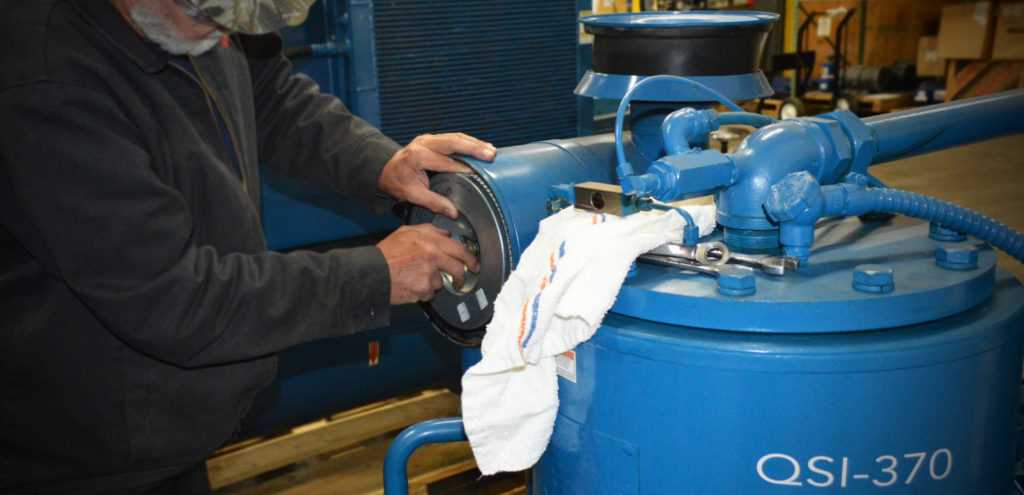
Inspect the air compressor for any signs of wear, leaks, or damage. Check the belts, hoses, and fittings for any cracks or signs of deterioration. Replace any worn-out or damaged parts immediately to prevent further damage to the compressor.
Check the air filters and replace them if necessary. Clogged or dirty filters can reduce the efficiency of the compressor and lead to more frequent maintenance and repairs. Clean or replace the filters according to the manufacturer’s instructions.
Inspect the oil level and quality in the compressor’s oil reservoir. If the oil is low or dirty, drain and replace it with fresh oil as per the manufacturer’s guidelines. Regular oil changes are essential to keep the compressor running smoothly and prevent damage to the internal components.
Finally, check the pressure relief valves for proper functioning. These valves are designed to release excess pressure and prevent overloading of the compressor. If any valves are faulty or not working correctly, they should be replaced immediately.
By regularly cleaning and inspecting your air compressor, you can ensure its optimal performance and prevent costly repairs. Develop a maintenance schedule and follow it diligently to extend the lifespan of your compressor and keep it in excellent working condition.
Lubrication and Oil Changes
To ensure proper functioning and longevity of your air compressor, lubrication and regular oil changes are crucial. Lubrication helps reduce friction and heat, preventing wear and tear on the moving parts of the compressor.
1. Check the lubrication: Before starting the compressor, make sure to check the lubrication level. Most air compressors have a sight glass or dipstick to easily check the oil level. If the level is low, add the recommended lubricant to the appropriate fill line.
2. Regular oil changes: Like any machinery, air compressors require regular oil changes. The frequency of oil changes depends on the compressor model and usage, but a general guideline is to change the oil every 500-1,000 hours of operation or every 3 months, whichever comes first.
3. Use the correct oil: It’s important to use the recommended oil type for your specific compressor model. Using the wrong oil can lead to poor performance, increased wear, and even damage to the compressor. Refer to the manufacturer’s guidelines or consult a professional if you are unsure about the correct oil type.
4. Drain the old oil properly: When performing an oil change, it’s essential to drain the old oil properly. Follow the manufacturer’s instructions for draining the oil, as different compressors may have different drain mechanisms. Ensure that the compressor is turned off and cooled down before attempting to drain the oil.
5. Keep a maintenance schedule: Maintaining a regular maintenance schedule for lubrication and oil changes will help keep your air compressor in optimal condition. Keep track of the date and hours of operation to determine when the next oil change is due. Regular maintenance is crucial for the long-term performance and durability of your air compressor.
6. Monitor oil quality: Apart from regular oil changes, it’s important to monitor the quality of the oil. Over time, oil can become contaminated with dirt, moisture, and other particles, which can affect the compressor’s performance. If the oil appears dirty or has water droplets, it may be a sign that it needs to be changed sooner than the regular interval.
7. Seek professional help if needed: If you are unsure about performing lubrication or oil changes on your air compressor, it’s best to seek professional help. A qualified technician can guide you through the process and ensure that the proper lubrication and oil change procedures are followed. This will help prevent any potential damage to the compressor and keep it running smoothly.
Proper Storage and Protection
Proper storage and protection are essential for maintaining the longevity and performance of your air compressor. Here are some tips to help you store and protect your compressor:
1. Clean and dry storage area
Store your air compressor in a clean and dry area to prevent any moisture or contaminants from damaging the unit. Moisture can lead to rust and corrosion, while contaminants can clog the compressor’s components. Ensure the storage area is free from dust, dirt, and debris.
2. Secure and stable location
Choose a secure and stable location to store your air compressor. The storage area should be away from any potential hazards or elements that can cause damage, such as extreme temperatures, direct sunlight, or excessive vibrations. A stable location will prevent the compressor from falling or tipping over.
3. Proper ventilation
Ensure the storage area has proper ventilation to prevent overheating and to allow for the dissipation of heat generated during operation. Good airflow will help keep the compressor’s internal components cool and prevent any potential damage from excessive heat buildup.
4. Cover the compressor
When not in use, cover your air compressor with a protective cover or tarp to shield it from dust, dirt, and other debris that can accumulate on the unit. This will also help prevent any accidental damage or scratches from occurring.
5. Regular maintenance
Perform regular maintenance on your air compressor, even during storage periods. This includes checking and changing the oil, inspecting and cleaning filters, and ensuring all connections and hoses are tight and free from leaks. Regular maintenance will help keep your compressor in optimal condition and ready for use when needed.
By following these proper storage and protection practices, you can ensure your air compressor remains in good working condition and extends its lifespan.
Monitoring and Adjusting Pressure Levels
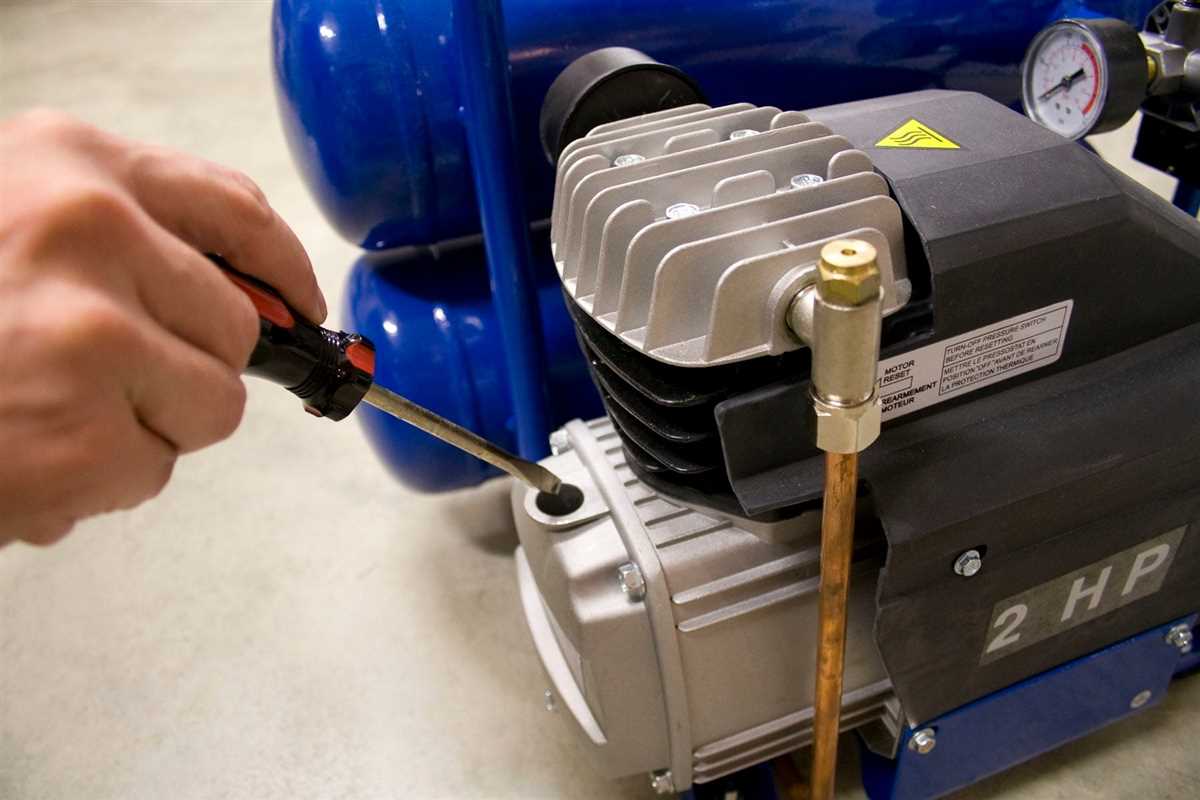
Monitoring and adjusting the pressure levels of your air compressor is essential for maintaining optimal performance and prolonging the lifespan of the equipment. Regularly checking the pressure levels ensures that the compressor is operating within the recommended range and can help prevent overloading or underutilization.
To monitor the pressure levels, use a pressure gauge that is compatible with your air compressor. Attach the gauge to the outlet valve and turn on the compressor. The gauge will display the current pressure reading, allowing you to see if it is within the desired range. It’s important to keep in mind that different tools and applications may require different pressure levels, so be sure to consult the manufacturer’s recommendations.
If the pressure levels are too high, you may need to adjust them to prevent damage to the compressor or the attached tools. To do this, locate the pressure regulator knob or switch on your compressor. Gradually adjust the knob or switch to decrease the pressure until it reaches the desired level. It’s important not to make sudden or drastic adjustments as this can cause fluctuation in the output pressure.
Regularly monitoring and adjusting the pressure levels of your air compressor can help ensure efficient and safe operation. By maintaining the appropriate pressure, you can prevent potential damage, increase the lifespan of your equipment, and achieve optimal performance for your tools and applications.
Regular Filter Replacement
Why is filter replacement important?
Regular filter replacement is essential for maintaining the efficiency and longevity of your air compressor. Filters are designed to remove dust, dirt, and other contaminants from the air that enters the compressor. Over time, these particles can accumulate and clog the filter, reducing its effectiveness in filtering the air. This can lead to decreased performance, increased energy consumption, and potentially even damage to the compressor.
How often should you replace the filters?
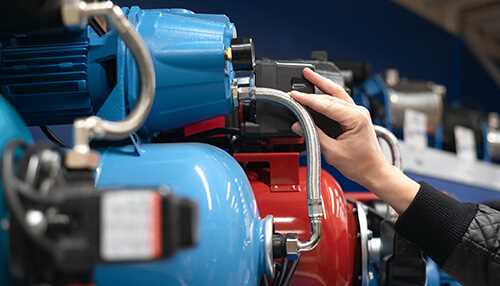
The frequency of filter replacement will depend on factors such as the type of compressor, the quality of the air in your environment, and the compressor usage. Generally, it is recommended to replace the filters at least once a year. However, in dusty or dirty environments, more frequent replacement may be necessary.
Types of filters
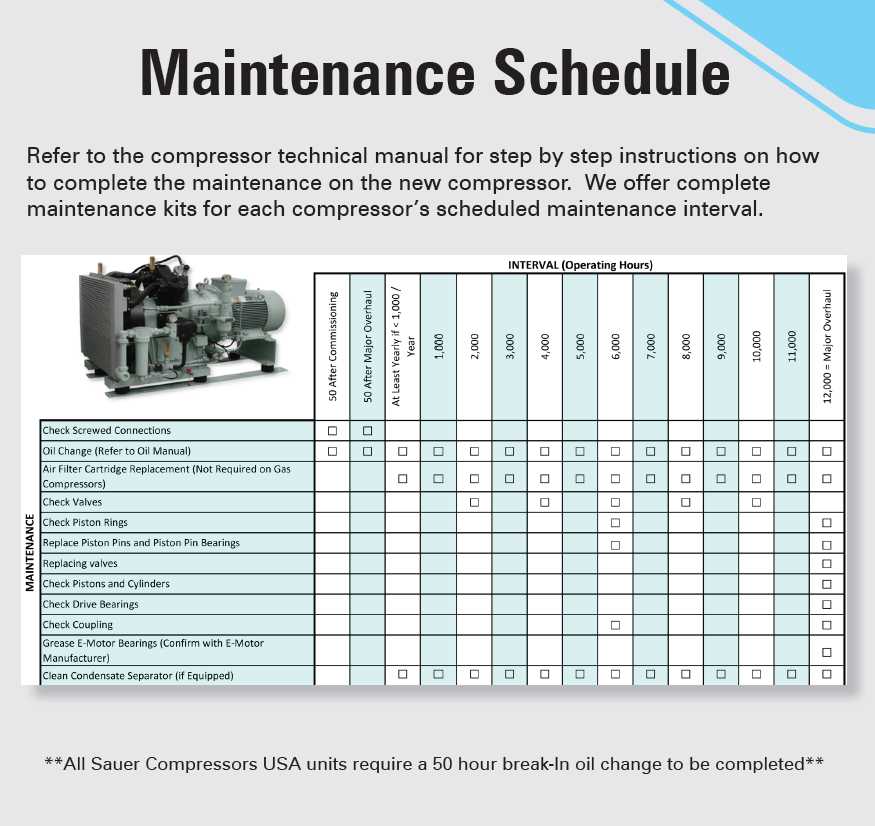
There are different types of filters used in air compressors, including intake filters, oil filters, and coalescing filters. Intake filters are responsible for removing larger particles from the air, while oil filters remove oil contaminants. Coalescing filters are designed to remove moisture and oil aerosols from the air. It is important to regularly check and replace these filters as needed to ensure optimal performance.
How to replace the filters
Replacing the filters is a relatively simple process. Start by turning off the compressor and relieving the pressure. Locate the filters, which are typically found near the compressor’s air intake. Remove the filter housing and take out the old filter. Inspect the new filter to ensure it is the correct size and type for your compressor. Insert the new filter into the housing, making sure it is properly seated. Reassemble the housing and turn on the compressor to ensure everything is working correctly.
Benefits of regular filter replacement
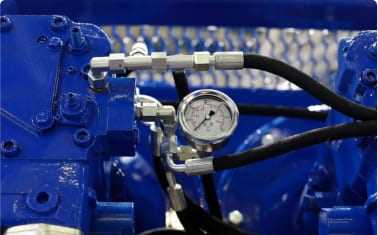
Regular filter replacement offers several benefits. It helps to maintain the air quality and prevent contamination and damage to the compressor. It also improves the overall efficiency of the compressor system, reducing energy consumption and ensuring optimal performance. Additionally, replacing the filters regularly can extend the lifespan of the compressor, saving you money on costly repairs and replacements in the long run.
In conclusion
Regular filter replacement is a vital aspect of air compressor maintenance. By replacing the filters on a regular basis, you can ensure that your compressor operates at its best and lasts for years to come.
Check for Leaks and Repair Promptly
Checking for leaks in your air compressor is an essential step in maintaining its efficiency and performance. Leaks can cause significant pressure loss and result in increased energy consumption and wear on the compressor components.
To check for leaks, start by visually inspecting the hoses, fittings, and connectors for any signs of damage or wear. Look for cracks, holes, or loose connections that may indicate a leak. You can also use a soap and water solution to create bubbles at the potential leak areas. If there is air escaping, bubbles will form, indicating a leak.
If you find any leaks, it is imperative to repair them promptly to prevent further damage and ensure optimal performance. Depending on the severity of the leak, you may need to replace the damaged parts, tighten loose connections, or use sealants or tape to seal the leak.
Regularly checking for and repairing leaks not only enhances the longevity of your air compressor but also helps save energy and reduce maintenance costs. It is a good practice to include leak checks as part of your routine maintenance schedule.
Maintain Proper Ventilation
Proper ventilation is essential for the efficient and safe operation of an air compressor. The compressor generates heat during operation, and if not properly ventilated, the excessive heat can damage the internal components.
To maintain proper ventilation, ensure that the compressor is placed in a well-ventilated area with sufficient airflow. Avoid placing the compressor in a confined space or near walls and other obstructions that can block the airflow.
Adequate ventilation not only helps to dissipate heat but also prevents the buildup of fumes and moisture. Moisture accumulation can lead to corrosion and rust, while fumes can be toxic and pose a health hazard.
Regularly check and clean the intake vents and filters to ensure proper airflow. Clogged vents and filters can restrict the air intake, causing the compressor to overheat. Remove any debris, dust, or dirt that may accumulate on the vents or filters.
Additionally, consider using fans or ventilation systems to improve airflow if necessary. Proper ventilation will help to extend the lifespan of your air compressor by preventing overheating and promoting efficient operation.
Schedule Professional Maintenance
Scheduling professional maintenance for your air compressor is essential for its overall performance and longevity. While regular maintenance tasks like cleaning or changing filters can be done by yourself, hiring a professional technician ensures that all components are thoroughly inspected and any potential issues are addressed.
A qualified technician will have the necessary skills and equipment to test the compressor’s pressure, lubricate moving parts, and identify any leaks or worn-out components. They can also check the electrical connections and make any necessary adjustments or repairs.
Regular professional maintenance not only helps prevent costly breakdowns but also improves the efficiency of your air compressor. A well-maintained compressor operates more smoothly, which reduces energy consumption and extends its lifespan. Additionally, professional technicians can provide valuable advice on optimizing your compressor’s performance and minimizing wear and tear.
When scheduling professional maintenance, it’s important to follow the manufacturer’s recommendations for frequency. In general, it’s recommended to have a professional inspection at least once a year, but high-usage compressors may require more frequent maintenance. Keeping a log of maintenance tasks and scheduling regular check-ups will help ensure that your air compressor operates at its best for years to come.
FAQ:
What are some tips for maintaining an air compressor?
Some tips for maintaining an air compressor include regularly checking and changing the oil, inspecting and cleaning the air filters, draining moisture from the tank, and tightening any loose connections.
How often should I check and change the oil in my air compressor?
You should check the oil level in your air compressor every time you use it, and change the oil every 500-1000 hours of operation, or as recommended by the manufacturer.
Why is it important to drain moisture from the tank of an air compressor?
It is important to drain moisture from the tank of an air compressor because the presence of moisture can lead to corrosion and damage to the tank and other components of the compressor. It can also cause issues with the quality of the compressed air.
What should I do if I notice any air leaks in my air compressor?
If you notice any air leaks in your air compressor, you should immediately tighten any loose connections or replace any damaged seals or gaskets. Air leaks can reduce the efficiency of the compressor and lead to increased energy consumption.
Video:









